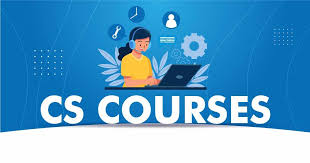What Are CS Courses?
Computer Science or CS courses are educational programs designed to teach students about programming, computing, data structures, algorithms and other computer-related systems and software development. Therefore, depending on the student’s background and goals, these courses can be found at various levels, from introductory to advanced.
Why Should You Take CS Courses?
You take CS courses for many reasons. It would be best if you had a solid foundation in computer science to start your career in technology, engineering, or business. In addition, they bring countless opportunities for computer professionals. Here are some of the main benefits:
- Career Opportunities: The tech industry is booming therefore computer science professionals are in high demand.
- Problem-Solving Skills: CS courses teach logical thinking and problem-solving techniques that are valuable in nearly every field.
- Versatility: You can work in software development, data analysis, cyber security, and more with CS knowledge.

Types of CS Courses Available
CS courses vary widely depending on your interests and the specific path you wish to pursue. Some common types of CS courses include:
Programming
These courses are for beginners who have little or no experience with coding. Students learn the basics of programming languages such as Python, Java, or C++ and get an introduction to algorithms and software development practices.
Data Structures and Algorithms
This intermediate-level course dives into the theory and practical application of data structures like arrays, linked lists, trees, and graphs. Moreover, students also learn about algorithms for sorting, searching, and optimization.
Software Engineering
In this course, students learn the process of designing, developing, testing, and maintaining software systems. Topics might include software development methodologies, version control, and quality assurance.
Web Development
This course focuses on building websites and web applications. Students learn languages like HTML, CSS, JavaScript, and frameworks like React and Angular. In addition, they also cover the backend technologies that power web apps, such as databases and server management.
Cyber security
Given the increasing number of cyber threats, cybersecurity courses focus on protecting systems, networks, and data. So students learn about encryption, secure coding practices, network security, and ethical hacking in detail.
Artificial Intelligence and Machine Learning
AI and machine learning courses cover algorithms and techniques used to develop intelligent systems capable of learning from data. Students work on projects like building recommendation engines or training chatbots.
How to Choose the Right CS Course for You?
With so many options available, it can be difficult to choose the right CS course. Here are a few things to consider when making your decision:
Your Current Skill Level: If you’re a beginner, start with introductory programming courses. If you’re already familiar with basic concepts, dive deeper into specialized topics.
Your Career Goals: If you’re interested in a career in software development, focus on courses that cover programming and software engineering. If you’re leaning towards data science then consider courses in machine learning or data analysis.
Time Commitment: You can take some CS courses part-time or in a flexible online format, while others may require a full-time commitment. So choose one that fits your schedule.
Where Can You Take CS Courses?
Many platforms offer online and offline CS courses. Some popular options include:
University Programs: Firstly, many universities offer bachelor’s and master’s degree programs in computer science.
Online Courses: Secondly, platforms like Coursera, Udemy, Coursetrendz, edX, and Codecademy offer online courses in a wide range of CS topics.
Bootcamps: In addition, coding boot camps like General Assembly and Flatiron School provide intensive, short-term programs designed to quickly teach you programming and other essential skills.
Conclusion
Computer Science courses are a valuable investment for anyone looking to develop skills in the ever-evolving tech landscape. Whether you’re just getting started or looking to deepen your knowledge, there are numerous opportunities to explore the world of computing and unlock exciting career prospects.

